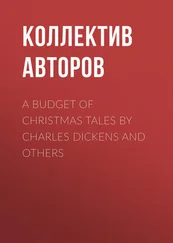Charles Dickens - Tales from Dickens
Здесь есть возможность читать онлайн «Charles Dickens - Tales from Dickens» — ознакомительный отрывок электронной книги совершенно бесплатно, а после прочтения отрывка купить полную версию. В некоторых случаях можно слушать аудио, скачать через торрент в формате fb2 и присутствует краткое содержание. Жанр: foreign_prose, на английском языке. Описание произведения, (предисловие) а так же отзывы посетителей доступны на портале библиотеки ЛибКат.
- Название:Tales from Dickens
- Автор:
- Жанр:
- Год:неизвестен
- ISBN:нет данных
- Рейтинг книги:3 / 5. Голосов: 1
-
Избранное:Добавить в избранное
- Отзывы:
-
Ваша оценка:
- 60
- 1
- 2
- 3
- 4
- 5
Tales from Dickens: краткое содержание, описание и аннотация
Предлагаем к чтению аннотацию, описание, краткое содержание или предисловие (зависит от того, что написал сам автор книги «Tales from Dickens»). Если вы не нашли необходимую информацию о книге — напишите в комментариях, мы постараемся отыскать её.
Tales from Dickens — читать онлайн ознакомительный отрывок
Ниже представлен текст книги, разбитый по страницам. Система сохранения места последней прочитанной страницы, позволяет с удобством читать онлайн бесплатно книгу «Tales from Dickens», без необходимости каждый раз заново искать на чём Вы остановились. Поставьте закладку, и сможете в любой момент перейти на страницу, на которой закончили чтение.
Интервал:
Закладка:
Oliver did not think his new host looked very respectable himself, but he thought it might be as well for him to know the old gentleman, particularly as he had nowhere else to go. So they set off.
It was night when they reached London, and it was so big and crowded that Oliver kept close to his guide. He noticed, however, that the streets they passed through were narrow and dirty and the houses old and hideously filthy. The people, too, seemed low and wretched.
He was just wondering if he had not better run away when the boy pushed open a door, drew Oliver inside, up a broken stairway and into a back room.
Here, frying some sausages over a stove, was a shriveled old Jew in a greasy flannel gown. He was very ugly and his matted red hair hung down over his villainous face. In a corner stood a clothes-horse on which hung hundreds of silk handkerchiefs, and four or five boys, as dirty and oddly dressed as the one who had brought Oliver, sat about a table smoking pipes like rough, grown men.
Oliver's guide introduced him to the Jew, whose name was Fagin, and the boys crowded around him, putting their hands into his pockets, which he thought a queer joke. Fagin grinned horribly as he shook hands with him and told him he was very welcome, which did not tend to reassure him, and then the sausages were passed around. The Jew gave Oliver a glass of something to drink, and as soon as he drank it he became very sleepy and knew nothing more till the following morning.
The next few days Oliver saw much to wonder at. When he woke up, Fagin was sorting over a great box full of watches, which he hid away when he saw Oliver was looking. Every day the boy who had brought him there, whom they called "the Artful Dodger," came in and gave the Jew some pocketbooks and handkerchiefs. Oliver thought he must have made the pocketbooks, only they did not look new, and some seemed to have money in them. He noticed, too, that whenever the Artful Dodger came home empty-handed Fagin seemed angry and cuffed and kicked him and sent him to bed supperless; but when he brought home a good number everything was very jolly.
Whenever there was nothing else to do, the old Jew played a very curious game with the boys. This was the way they played it:
Fagin would put a snuff-box in one pocket, a watch in another and a handkerchief in a third; then he would walk about the room just as any old gentleman would walk about the street, stopping now and then, as if he were looking into shop-windows. All the time the boys followed him closely, sometimes treading on his toes or stumbling against him, and when this happened one of them would slip a hand into his pocket and take out either the watch or the snuff-box or the handkerchief. If the Jew felt a hand in his pocket he cried out which it was, and then the game began all over again. At last Fagin made Oliver try if he could take something out of his pocket without his knowing it, and when Oliver succeeded he patted his head and seemed well pleased.
But Oliver grew very tired of the dirty room and the same game. He longed for the open air and begged to be allowed to go out; so one day the Jew put him in charge of the Artful Dodger and they went upon the streets, Oliver wondering where in the world he was going to be taught to make pocketbooks.
He was on the point of asking, when the Artful Dodger signed to him to be silent, and slunk behind an old gentleman who was reading a book in front of a book-stall. You can imagine Oliver's horror when he saw him thrust his hand into the old gentleman's pocket, draw out a silk handkerchief and run off at full speed.
In an instant Oliver understood the mystery of the handkerchiefs, the watches, the purses and the curious game he had learned at Fagin's. He knew then that the Artful Dodger was a pickpocket. He was so frightened that for a minute he lost his wits and ran off as fast as he could go.
Just then the old gentleman found his handkerchief was gone and, seeing Oliver running away, shouted "Stop thief!" which frightened the poor boy even more and made him run all the faster. Everybody joined the chase, and before he had gone far a burly fellow overtook Oliver and knocked him down.
A policeman was at hand and he was dragged, more dead than alive, to the police court, followed by the angry old gentleman.
The moment the latter saw the boy's face, however, he could not believe it was the face of a thief, and refused to appear against him, but the magistrate was in a bad humor and was about to sentence Oliver to prison, anyway, when the owner of the book-stall came hurrying in. He had seen the theft and knew Oliver was not guilty, so the magistrate was obliged to let him go.
But the terror and the blow he had received had been too much for Oliver. He fell down in a faint, and the old gentleman, whose name was Mr. Brownlow, overcome with pity, put him into a coach and drove him to his own home, determined, if the boy had no parents, to adopt him as his own son.
II
OLIVER'S ADVENTURES
While Oliver was resting in such good hands, very strange things were occurring in the house of Fagin. When the Artful Dodger told him of the arrest the Jew was full of anger. He had intended to make a clever thief of Oliver and compel him to bring him many stolen things; now he had not only failed in this and lost the boy's help, but he was also afraid that Oliver would tell all about the wicked practices he had seen and show the officers where he had lived. This he thought was likely to happen at any time, unless he could get the boy into his power again.
Something had occurred, too, meantime, that made Fagin almost crazy with rage at losing him. It was this: A wicked man – so wicked that he was afraid of thunder – who went by the name of Monks, had come to him and told him he would pay a large sum of money if he could succeed in making Oliver a thief and so ruin his reputation and his good name.
It was plain enough that for some reason the man hated Oliver, but, cunning as Fagin was, he would never have guessed why. For Monks was really Oliver's older half-brother!
A little while before this story began, Oliver's father had been obliged to go on a trip to a foreign country, where he died very suddenly. But before he died he made a will, in which he left all his fortune to be divided between the baby Oliver and his mother. He left only a small sum to his older son, because he knew that he was wicked, and did not deserve any. The will declared Oliver should have the money only on condition that he never stain his name with any act of meanness, dishonor, cowardice or wrong. If he did do this, then half the money was to go to the older son. The dying man also wrote a letter to Oliver's mother, telling her that he had made the will and that he was dying; but the older son, who was with him when he died, found the letter and destroyed it.
So Oliver's poor mother, knowing nothing of all this, when his father did not come back, thought at last that he had deserted her, and in her shame stole away from her home, poor and ill-clad, to die finally in the poorhouse.
The older brother, who had taken the name of Monks, hunted and hunted for them, because he hated Oliver on account of their father's will, and wanted to do him all the harm he could. He discovered that they had been taken into the poorhouse, and went there, but this was after Oliver had run away. He found, however, to his satisfaction, that the boy knew nothing about his parentage or his real name, and Monks made up his mind to prevent his ever learning.
There was only one person who could have told Oliver, and that one was Mrs. Bumble. She knew through the locket she had kept, which had belonged to Oliver's mother and which contained the dead woman's wedding-ring with her name engraved inside it. When Mrs. Bumble heard that a man named Monks was searching for news of Oliver, she thought it a capital chance to make some money. She went, therefore, to Monks's house and sold the locket and ring to him. These, Monks thought, were the only proofs in the world that could ever show Oliver who he was, and to make it impossible for him ever to see them, he dropped them through a trap-door in his house down into the river, where they could never be found.
Читать дальшеИнтервал:
Закладка:
Похожие книги на «Tales from Dickens»
Представляем Вашему вниманию похожие книги на «Tales from Dickens» списком для выбора. Мы отобрали схожую по названию и смыслу литературу в надежде предоставить читателям больше вариантов отыскать новые, интересные, ещё непрочитанные произведения.
Обсуждение, отзывы о книге «Tales from Dickens» и просто собственные мнения читателей. Оставьте ваши комментарии, напишите, что Вы думаете о произведении, его смысле или главных героях. Укажите что конкретно понравилось, а что нет, и почему Вы так считаете.












